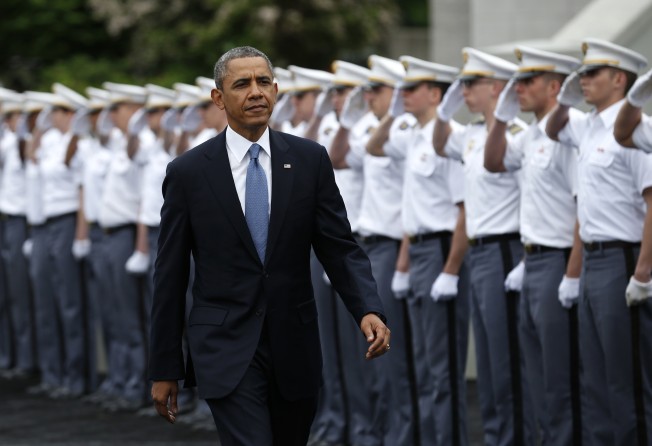Accommodating China's rise is America's only realistic option
Andrew Leung says the US should wield influence through the power of its enduring values

President Barack Obama's speech to West Point graduates last month reaffirmed that the US would seek to lead, reminding everyone of America's exceptional status as the "one indispensable nation". However, instead of plans to commit more blood and treasure to the world's hot spots, between the lines was a desire for allies to share the burden, albeit with American help.
This seems to reflect the dramatic turn in public expectations of America's role in the world. According to a Pew survey last December, some 51 per cent of respondents said the US does "too much" to solve world problems. More alarmingly, the survey suggests that Americans now see a US in decline.
On the other hand, for the first time ever, more Americans view China as their country's greatest enemy than any other country in the world, according to a Gallup poll this year. No wonder Obama has been redoubling efforts to shore up America's "pivot" to Asia and negotiations for the Trans-Pacific Partnership, both widely interpreted as a China containment strategy.
So it was a little strange to find no mention of this strategy in Obama's West Point speech. Perhaps this reflects the following realities.
First, the Asian pivot is hardly working. Before its launch, China was largely prepared to leave territorial disputes for future generations to resolve. Now, in response to emboldened rival territorial claims, China is adopting a tactic of "assertive incrementalism" in disputed waters. Exacerbation of these disputes hardly improves regional security or bolsters American influence. Solidarity among members of the Association of Southeast Asian Nations is being split between assertive claimants and the rest who seek to further economic ties with China.
Second, using military dominance to contain China in peacetime is unlikely to be effective in the age of nuclear deterrence.
Third, China has been beefing up its energy security. It is true that it could be vulnerable to sea-lane "choke points" in transporting critical energy and resources. These include the Malacca Strait under the sway of the US 7th Fleet and the Strait of Hormuz near Iran, where events are beyond China's control. However, for years, China has been developing overland pipelines in central Asia. Additionally, a US$400 billion gas deal has now been clinched with Russia.
Fourth, on the trade front, the Trans-Pacific Partnership remains a work in progress. What is more, it is questionable how effective it would be in locking China into an America-centric system while China remains the central hub of a global supply and production chain and has superseded the US as the world's largest trader.
Fifth, the pride of American global power is its overwhelming number of allies, supported by diplomatic and military ties. However, China now trades with more countries than America does. When push comes to shove, it is uncertain how many would bend towards America's will.
The above considerations are valid - except, however, they all come from a zero-sum toolbox. Most crucially, no one asks whether China should become a friend rather than an enemy. America may have got the wrong end of the stick.
Professor Zheng Yongnian, director of the East Asian Institute at the National University of Singapore, suggests that America risks its own decline because of global overreach and wrongly choosing China as its enemy. He thinks "new great power relations" touted by President Xi Jinping mean that China has benefited from and wants to continue to support the existing America-dominated world order, provided some of China's "core interests" are taken care of.
Singapore statesman Lee Kuan Kew bluntly suggests that the US should say to China, "We will eventually be equal, and you may eventually be bigger than me, but we have to work together. Have a seat, and let us discuss the world's problems." He also points out that America's greatest long-term influence on China comes from playing host to thousands of China's ablest and brightest who go to study in the US.
Realistically, China is unlikely to replicate American-style democracy. But becoming more liberal, more open, more equitable and more environmentally sustainable are very much in keeping with China's declared development strategies.
China does not want or need to be America's enemy. With growing gravitas, it can be an influential friend in maintaining and perfecting the global liberal order that has driven its successful development.
Instead of fretting about how to contain or balance against a rising China, America should spend more time and effort accommodating its rise as a responsible stakeholder of the world order. The way to go about this is not through military dominance, but America's unrivalled soft power of institutions and values that endure.
Andrew K. P. Leung is an international and independent China specialist based in Hong Kong